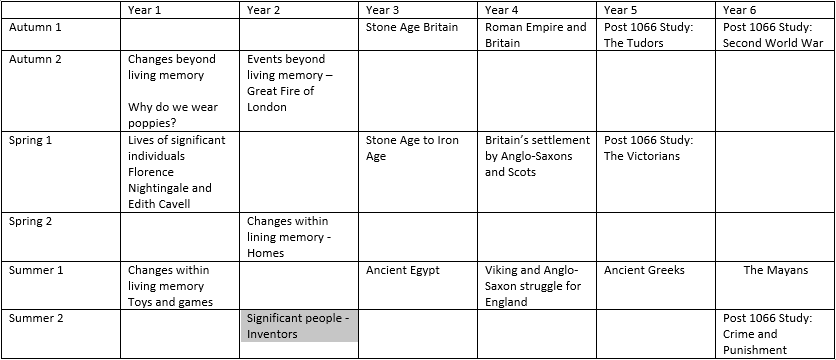History
"We should not look back unless it is to derive useful lessons from past errors, and for the purpose of profiting by dearly bought experience."
George Washington
A high-quality history education will help pupils gain a coherent knowledge and understanding of Britain’s past and that of the wider world. It should inspire pupils’ curiosity to know more about the past.
To have a rich understanding of previous events and to generate questions and conversations that will deeper knowledge of the curriculum.
As a school, we believe that high-quality History learning encourage critical thinking skills, the ability to collate evidence, immerse in discussions and allows pupils to develop perspective and judgement. Our History curriculum will also enable children to gain a sense of their own identity within a social, political, cultural and economic background.
The National Curriculum for History aims to ensure that all pupils:
- know and understand the history of these islands as a coherent, chronological narrative, from the earliest times to the present day: how people’s lives have shaped this nation and how Britain has influenced and been influenced by the wider world.
- know and understand significant aspects of the history of the wider world: the nature of ancient civilisations; the expansion and dissolution of empires and characteristic features of past non-European societies.
- gain understanding of abstract terms such as ‘empire’, 'civilisation' and ‘parliament'.
- understand historical concepts such as continuity and change, cause and consequence, similarity, difference and significance, and use them to make connections, draw contrasts, analyse trends, frame historically valid questions and create their own structured accounts, including written narratives.
- understand the methods of historical enquiry, including how evidence is used rigorously to make historical claims, and discern how and why contrasting arguments and interpretations of the past have been constructed.
- gain historical perspective by placing their growing knowledge into different contexts, understanding the connections between local, regional, national and international history; between cultural, economic, military, political, religious and social history; and between short- and long-term timescales.
Intent
At Brookfield Junior Academy, we believe that high quality history lessons inspire children to want to learn more about the past and to think and act as historians. Our aims are
- To instil in the children a curiosity and understanding of events, places and people in a variety of times and environments
- To develop an interest in the past and an appreciation of human achievements and aspirations.
- To understand the values of our society
- To learn about the major issues and events in the history of our own country and of the world and how these events may have influenced one another
- To develop a knowledge of chronology within which the children can organise their understanding of the past
- To understand how the past was different from the present and that people of other times and places may have had different values and attitudes from ours
- To understand the nature of evidence by emphasising the process of enquiry and by developing the range of skills required to interpret primary and secondary source materials
- To distinguish between historical facts and the interpretation of those facts
- To understand that events have a multiplicity of causes and that historical explanation is provisional, debatable and sometimes controversial
Implementation
History at Brookfield Junior Academy is taught in blocks throughout the year, so that children can achieve depth in their learning. The key knowledge, skills and vocabulary of each unit builds progressively across each year group, therefore allowing children to build on prior learning and make links across units. Tasks are selected and designed to provide appropriate challenge to all learners. To create an engaging History curriculum, provision is resourced to support effective teaching and learning. In addition to this, cross curricular links are planned wherever possible and the local area is fully utilised, with extensive opportunities for learning outside the classroom actively encouraged.
Impact
The impact of successful teaching and learning in History at Brookfield Junior Academy will be shown through outcomes in curriculum and literacy books. Within these books there will be evidence of a broad and balanced History curriculum that demonstrates children’s knowledge and understanding relating to each of the identified National Curriculum strands. Work will be regularly displayed and shared throughout school or via our Brookfield Junior Academy’s Facebook page and website. Discussions with children will automatically show a love for historical learning and they will be willing to share what they have learned with others in a positive and inspiring manner.
The ACET Long Term Planning outlines the topics each year group will study and the enquires they will complete.

If you have any questions about how HISTORY is taught within school or how to further support your children at home please do not hesitate to contact Miss Sales (HISTORY LEAD).